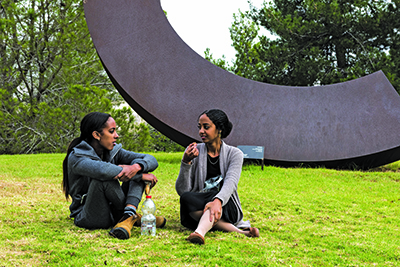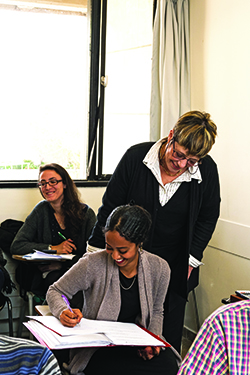Health + Medicine
Feature
Helping Ethiopian Israeli Find Careers in Nursing

Baza “Maya” Alemitu trained as a medic in the Israel Defense Forces. “I loved it. All I wanted after my army service was to be a nurse,” says the Ethiopian-born 26-year-old. “I was shattered when my psychometric grade wasn’t anywhere near high enough, I thought, to get into any nursing school in Israel.”
Although Alemitu left Addis Ababa in Ethiopia for Israel at age 7, she is one of thousands of Ethiopian Israelis who have run into the cultural bias implicit in the Psychometric Entrance Test, an SAT equivalent that screens applicants to higher education in Israel. With Ethiopian Israelis typically scoring 25 percent lower than the general Jewish population, Israel’s psychometric test is an impassable barrier for the majority of the youth of this community of 135,000. Only 11 percent of 22- to 35-year-old Ethiopian Israelis have an undergraduate degree, compared with 42 percent of all Israeli Jews of the same age.
Today, Alemitu is interning on Hadassah–Hebrew University Medical Center’s general surgery wards after taking part in a groundbreaking pilot program to train Ethiopian Israeli nurses. The program, called Achotenu, launched four years ago but was first brought to Hadassah in 2016. Alemitu is one of the first to take part in Achotenu, founded by the nonprofit JobKatif. Now supported by the Henrietta Szold Hadassah–Hebrew University School of Nursing in Jerusalem; Hadassah, the Women’s Zionist Organization of America; and JobKatif, the program currently has 18 students at the nursing school who are working toward a Bachelor of Science in nursing.
Achotenu’s beginnings, however, emerged from an entirely different time and for an entirely different purpose.
The time was August 2005 and the place was Gush Katif in the southern Gaza Strip. Some 8,000 people were being relocated after Israel’s unilateral disengagement from Gaza. There was nothing that could be done about the homes left behind, thought a young Tel Aviv-born rabbi, Yosef Zvi Rimon, but he could address the matter of lost livelihoods. Rimon, rabbi of Alon Shvut, southwest of Jerusalem in Gush Etzion, created an apolitical agency to help the Gush Katif evacuees find work. Called JobKatif, it helped 2,600 people re-enter the workplace. Rimon was awarded Israel’s 2008 Presidential Award for Volunteerism.
By 2013, with 85 percent of working-age evacuees employed, Rimon turned to another population in need of gainful employment. “I saw young Ethiopians working as supermarket cashiers, shopping mall security guards and nursing home aides,” he recalls. “I wondered: ‘Don’t they aspire to more stable, dynamic professions?’ The answer was, ‘Of course they do!’”
So JobKatif added another mandate. “Step one was finding out what Ethiopian Israelis want to do, and step two was removing the obstacles,” says Judy Lowy, JobKatif’s British-born executive director. “We quickly learned that an overwhelming number of Ethiopian women, and many men, dream of nursing careers. We investigated further and learned there’s a massive shortage of hospital nurses in Israel,” she says, noting that in nurse-to-patient ratio, Israel was ranked 35th of 35 in the 2013 Organisation for Economic Co-operation and Development index.
The primary obstacle was the psychometric. When Lowy discovered that the country’s government hospitals reserve places for some students to enroll in a two-and-a-half-year Registered Nurse diploma course without a psychometric exam, JobKatif secured 11 such slots in four hospitals for a pilot program. “We launched Achotenu—which means both ‘our sister’ and ‘our nurse’—in October 2013, quietly and without fanfare, because we had no idea whether we were on the right track,” says Lowy.
Alemitu was among the 11 first- and second-generation Ethiopian Israelis, ages 23 to 37, selected for the pilot. They all had graduated from high school but scored poorly on their psychometric. “I’d just got my horrible exam grade and was trying to reconcile never being a nurse when I heard about Achotenu,” says Alemitu. “It was late, registration was closing and I raced to get my name down.”

Candidates were assessed according to methods developed by renowned Israeli psychologist Reuven Feuerstein, Ph.D., in the 1950s for Israel’s North African immigrants—a system designed to eliminate cultural bias by measuring learning ability instead of comparing performance with expectations determined by background, language, dress and values. All of the students in the program—except one who dropped out for nonacademic reasons—obtained their Registered Nurse diplomas easily, two of them summa cum laude.
JobKatif staff followed them throughout the program, teaching strategic learning skills and providing tutorials and enrichment classes along with tuition and monthly living subsidies and emotional support. This support, says Lowy, often focused on how Ethiopians are seen in Israel and how they see themselves. “We addressed, for example, how to respond to surprise among classmates when Achotenu students got good exam results,” she says. “Another issue was their difficulty hearing lecturers in the large auditorium. It emerged that all sat at the back, feeling this was their place. They made a group decision to sit further forward.”
While the RN pilot program was a success, most hospitals prefer academic nurses, meaning those with a Bachelor of Science in nursing. To help their students, Achotenu would have to penetrate academic nursing schools. It was at this point that, in the view of JobKatif’s organizational psychologist, Arielle Sullum, a greater power intervened.
“I was in the United States early in 2015, and told my aunt about the Achotenu pilot,” she says. “She had a Hadassah friend and put me in touch. The timing couldn’t have been more perfect, because HWZOA had just received an endowment from a nurse, businesswoman and philanthropist named Patricia Lapan. She had earmarked it for underprivileged young nursing students! The Lapan Nursing Scholarship followed.”
“The Lapan scholarship helps immigrants, provides jobs and strengthens health care, all in one,” says Nancy Falchuk, a past Hadassah national president and herself a former nurse. “It’s Zionism at its best.”
JobKatif, too, was delighted. “Hadassah’s support sends a positive message not only to Israel’s Ethiopian community but far beyond,” says Lowy.
With Hadassah on board, JobKatif would continue its support package. The next step, then, was bringing in the Hebrew University of Jerusalem. “Nursing is an excellent if rigorous social mobility path,” says Miri Rom, Ph.D., director and associate dean of the nursing school. “We were excited about it—and geared up for what we anticipated would be a fierce battle with the Hebrew University over entrance requirements.”
To Rom’s surprise, there was no battle. “The university opened its hearts and gates,” she says. “They willingly agreed to adapt their admissions procedure, using the Feuerstein test and restructuring the mandatory interview to focus on competence.” The program will take five years, with a preparatory year added to the existing four-year degree, and requires an average grade of 80 throughout those years. Of the 100 candidates who applied, 15 women and three men were accepted and, and in October 2016, four months after announcing the program, they began.
All the students had high school diplomas and IDF or National Service behind them. Many had some medical background. Manloush, 22, for example, had been a dental assistant in the IDF Medical Corps and worked in a dental clinic following his discharge. Tamar, also 22, had been a hospital assistant during her National Service but found only factory work afterward. (The students prefer not to disclose their last names.)
“It goes without saying that every member of the class is highly motivated,” says Rom. “Nursing is a lifelong commitment to patients, where nothing less than 100 percent is needed every day.”
Alemitu, too, will be taking classes to upgrade her RN to a BSN at the Shaare Zedek Medical Center in Jerusalem even as she works at Hadassah Hospital with fellow Achotenu pilot program graduate Rahel Tadela.
“Rahel and I wanted to intern at Hadassah because it’s big and well known,” says Alemitu. “I’m determined to make it all the way and become an academic nurse, both for myself and for what I represent in my community. They see me as a success, an example of what we can achieve.”
Wendy Elliman is a British-born science writer who has lived in Israel for more than four decades.










 Facebook
Facebook Instagram
Instagram Twitter
Twitter
Leave a Reply